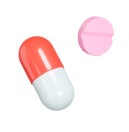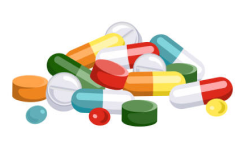What is biologic and biosimilar?
Biosimilars are the non-branded versions of the original biologic. Original reference biologics are usually more expensive because of the high cost of researching and manufacturing them, therefore biosimilars can be marketed once the patent on the original biologic has expired.
Biosimilars are comparable in terms of quality, safety and efficacy to their version of an approved original biologics but are more affordable.
Both biologics and biosimilars are one kind of disease-modifying anti-rheumatic drugs (also known as “DMARDs”). They reduce uncontrolled immune processes and inflammation in your joints, skin, muscles and gut. This improves symptoms, reduces flares, stops disease progression and improves quality of life.
The term “biologic” or “biosimilar” simply means the medications are derived from animal or human proteins and not from chemicals (unlike other medications). They are highly effective medications that have been used for years.
How do biologics and biosimilar work?
Biologics target specific parts of the immune system. It can block actions of specific types of immune cells such as white blood cells called T-cell or B-cell. It can also block specific proteins in the immune system such as tumour necrosis factor-alpha (TNF-alpha), interleukin (IL) 17-A, IL-12, IL-23, IL-6, interferon and CD-20 (protein found on B-cell). These cells or proteins are known to be involved in the inflammation processes implicated in various medical conditions.
|
Common examples of biologics
|
||||||||
| TNF-alpha blocker
|
IL-1 blocker
|
IL-6 blocker
|
IL-17 blocker
|
IL-23 blocker
|
IL-12/23 blocker
|
B-cell blocker
|
T-cell blocker
|
Integrin receptor blocker
|
|
Adalimumab
Certolizumab
Etanercept
Golimumab
Infliximab
|
Anakinra, Canakinumab Rilonacept | Tocilizumab | Ixekinumab Secukinumab | Guselkumab Risankizumab | Ustekinumab | Belimumab Rituximab | Abatacept | Vedolizumab |
What are biologics and biosimilars used for?
They are indicated in a wide range of medical conditions such as:
- Ankylosing spondylitis (AS)
- Inflammatory bowel disease (IBD) such as Crohn’s Disease (CD) and Ulcerative Colitis (UC)
- Juvenile (children) arthritis
- Multiple sclerosis (MS)
- Psoriasis
- Psoriatic arthritis (PsA)
- Rheumatoid arthritis (RA)
- Scleroderma
How should I take/use this medication?
Biologics and biosimilars are given by subcutaneous injection (injected into fat tissue under the skin) or intravenous infusion (injected directly into a vein) because these proteins can be damaged by stomach acid if given by mouth. Infusions will require administration by a healthcare professional in a hospital or clinic while self-injection can be performed by a patient or caregiver at home.
The injection may be given daily, weekly, every few weeks or every year. Your doctor will discuss with you which biologic or biosimilar is most appropriate for you, how to give and how often to be given.
What are the side-effects of this medication?
| Side effects for biologics and biosimilars
|
||
Common > 10%
|
Uncommon 1-3%
|
Rare < 1 in 1000
|
- Increased risk of infection such as upper respiratory tract infection (URTI), urinary tract infection (UTI) and skin infections. If you develop a fever, sore throat, pain on urination or feel generally unwell, see a doctor immediately.
- Reactivation of certain infectious diseases such as Hepatitis B or Tuberculosis (TB). Your doctor will order tests to assess your risk and decide on treatment before starting a biologic or biosimilar. In addition, your doctor will ensure your vaccination status is updated to further reduce your risk of getting an infection.
- Increased risk of certain cancer such as lymphoma (cancer of the blood cell), skin and lung. Your doctor will examine you regularly and order tests when necessary for monitoring.
- Allergic reactions such as shortness of breath, chills, itchiness, redness or swelling around the eyes/lips/skin may develop. Certain medications may be given before the injection to minimise this risk. If you experience any of such symptoms, stop the medicine and see your healthcare professional so it can be treated immediately.
Disclaimers
Please take note that the above is not a complete list of all possible side-effects. If you have any concerns about your medication or if you have other side-effects that you think are caused by this medication, please consult your doctor or pharmacist. If you take more than the recommended dose, please seek medical advice immediately. The information provided on this page does not replace information from your healthcare professional. Please consult your healthcare professional for more information.
This article is jointly developed by members of the National Medication Information workgroup. The workgroup consists of cluster partners (NHG Health, National University Health System and SingHealth), community pharmacies (Guardian, Unity and Watsons) and Pharmaceutical Society of Singapore. The content does not reflect drug availability and supply information in pharmacies and healthcare institutions. You are advised to check with the respective institutions for such information.

Need More Medicine?
Use Medicine Order Service on HealthBuddy.

Medicines Reminder
Get reminders and chart progress on HealthBuddy.




















